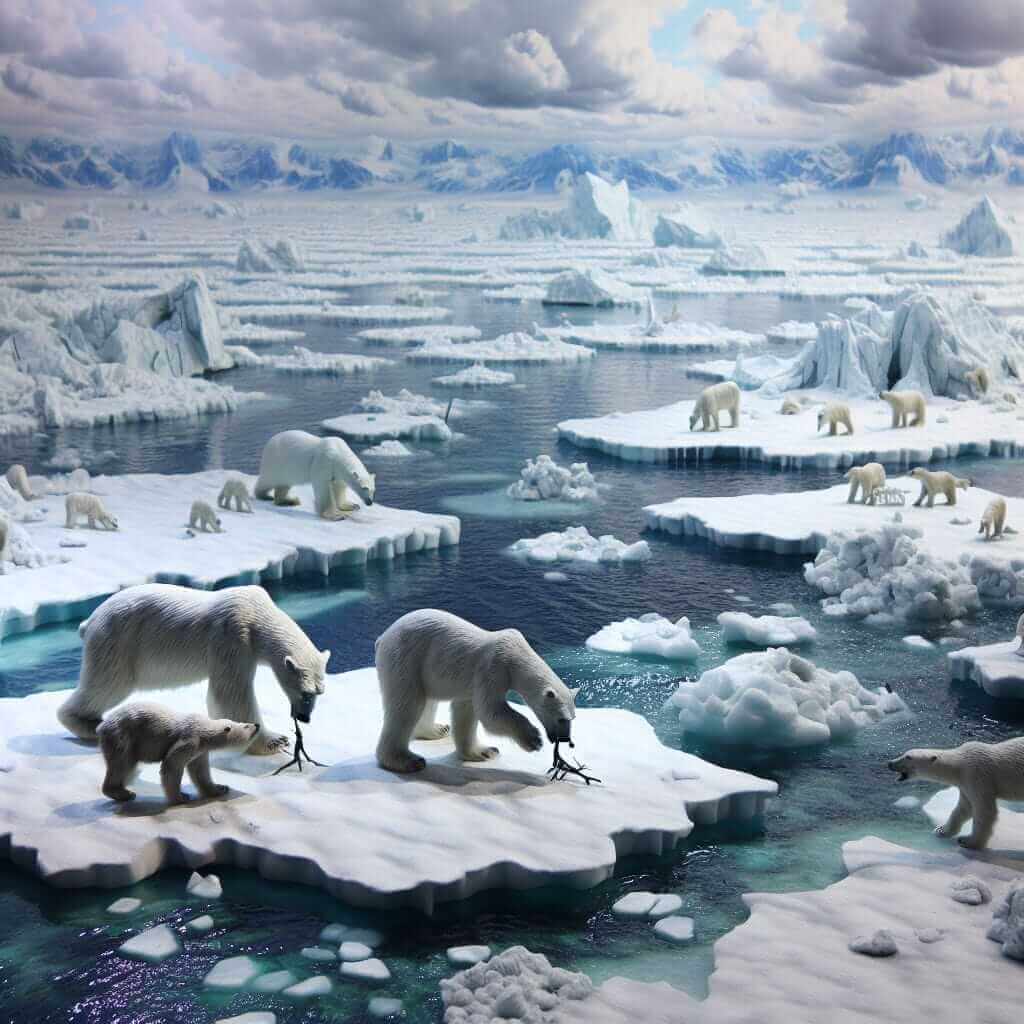Reading comprehension is a crucial part of the IELTS exam, requiring candidates to demonstrate their ability to understand and interpret written texts. One frequent topic is the environment, which is timely and relevant. In recent years, the effects of global warming on polar bears have garnered attention due to the increasing threat to their natural habitat. Understanding this topic can not only aid in the reading test but also increases awareness of environmental issues. This article provides a comprehensive reading test on the effects of global warming on polar bears, complete with questions, answers, and detailed explanations, to help candidates prepare effectively for the IELTS reading section.
IELTS Reading Practice: The Effects of Global Warming on Polar Bears
Passage
The Arctic Meltdown: Global Warming’s Impact on Polar Bears
Polar bears, native to the Arctic region, are facing unprecedented challenges due to global warming. The reduction in sea ice, which they rely on for hunting seals, is one of the most direct impacts of rising temperatures. From early spring to late autumn, polar bears depend on sea ice to catch seals, their primary food source. As the ice melts earlier and forms later each year, bears have less time to hunt, resulting in decreased body weight and fewer cubs.
Researchers have observed that shrinking ice affects not just the bears’ hunting grounds but also their migratory patterns and breeding habits. Polar bears are strong swimmers, but the increasing distance between ice floes forces them to swim longer distances, depleting their energy reserves. Scientist Steven Amstrider from the Polar Bear International states that the survival rate of cubs is also decreasing due to prolonged swims and the scarcity of prey.
Moreover, the changing environment has led to behaviors previously unobserved in polar bears. Reports of polar bears scavenging on carrion and even preying on terrestrial animals are becoming more common. These dietary shifts highlight the dire circumstances imposed by global warming.
The situation is exacerbated by pollution and human encroachment in the Arctic. The accumulation of pollutants in the polar bear’s diet, through the food chain, further weakens their health, reducing their reproductive success rate. The International Union for Conservation of Nature (IUCN) has classified polar bears as a vulnerable species, emphasizing the urgent need for conservation efforts.
In summary, global warming is threatening polar bears’ survival by altering their habitat, hunting practices, and overall health. Efforts to mitigate global warming by reducing greenhouse gas emissions are critical to protecting these iconic creatures and their ecosystem.
Questions
Multiple Choice
-
What is the primary food source for polar bears?
a. Fish
b. Seals
c. Plants
d. Birds -
Why are polar bears forced to swim longer distances?
a. To escape predators
b. To find mating partners
c. To catch fish
d. To reach scattered ice floes
True/False/Not Given
- Polar bears hunt seals primarily from late autumn to early spring.
- Research indicates that the survival rate of polar bear cubs is increasing due to global warming.
- Polar bears have started preying on terrestrial animals due to a shift in their environment.
Summary Completion
Sentence Completion:
6. Global warming affects polar bears by reducing .
7. As a result of global warming, polar bears are experiencing a decrease in the .
8. Pollution contributes to lower ____, further impacting polar bear populations.
Answer Keys and Explanations
Multiple Choice
-
b. Seals
Explanation: The passage states that polar bears rely primarily on hunting seals during the spring to autumn period. -
d. To reach scattered ice floes
Explanation: The increasing distance between ice floes due to melting ice forces polar bears to swim longer distances.
True/False/Not Given
-
False
Explanation: The passage specifies that polar bears rely on sea ice for hunting seals from early spring to late autumn. -
False
Explanation: The passage notes that the survival rate of cubs is decreasing due to the effects of global warming. -
True
Explanation: The passage mentions reports of polar bears scavenging on carrion and preying on terrestrial animals due to environmental changes.
Summary Completion
-
sea ice
Explanation: The reduction of sea ice is noted as one of the most direct impacts of rising temperatures on polar bears. -
body weight and number of cubs
Explanation: Melting ice results in decreased hunting time, leading to lower body weight and fewer cubs. -
reproductive success rate
Explanation: Pollution weakens polar bears’ health, reducing their reproductive success rate.
Common Mistakes
When practicing the reading passage, be mindful of the following common mistakes:
- Misinterpreting the timeline: Be sure to recognize the time frames given, such as “early spring to late autumn.”
- Understanding implied information: Don’t confuse implied statements with facts directly stated in the passage. For instance, the passage does not state that polar bears’ survival rate is increasing.
Vocabulary Highlights
1. Unprecedented (adj.) – /ʌnˈprɛsɪdɛntɪd/: never done or known before.
2. Depleting (verb) – /dɪˈpliːt/: using up the supply or resources of.
3. Scavenging (verb) – /ˈskævındʒɪŋ/: searching for and collecting discarded material.
4. Encroachment (noun) – /ɪnˈkrəʊtʃmənt/: intrusion on a person’s territory, rights, etc.
Grammar Tips
Complex Sentences:
- The passage utilizes complex sentences to present more detailed information, e.g. “As the ice melts earlier and forms later each year, bears have less time to hunt, resulting in decreased body weight and fewer cubs.”
Formula: [Dependent clause] + [Independent clause], resulting in [Effect].
Advice for IELTS Reading Preparation
- Practice Regularly: Consistent practice using realistic IELTS reading passages.
- Improve Vocabulary: Focus on environmental vocabulary as it’s a common theme.
- Time Management: Learn to manage your time effectively for completing all sections of the reading test.

In conclusion, understanding topics like “the effects of global warming on polar bears” can enhance your preparation for the IELTS reading section. Engage in active practice with passages, understand complex vocabularies, and hone your comprehension skills to achieve a high score.